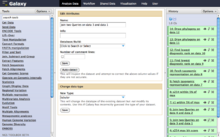 | |
| Developer(s) | Galaxy Community |
|---|---|
| Initial release | 16 September 2005 |
| Stable release | 24.1.1
/ July 2024 |
| Repository | github |
| Written in | Python, JavaScript |
| Operating system | Unix-like |
| Platform | Linux, macOS |
| Available in | English |
| Type | Scientific workflow, data integration, analysis and data publishing |
| License | MIT and Academic Free License[1] |
| Website | galaxyproject |
Galaxy[2] is a scientific workflow, data integration,[3][4] and data and analysis persistence and publishing platform that aims to make computational biology accessible to research scientists that do not have computer programming or systems administration experience. Although it was initially developed for genomics research, it is largely domain agnostic and is now used as a general bioinformatics workflow management system.[5]
- ^ "Project Licenses". GitHub.
- ^ The Galaxy Community (20 May 2024). "The Galaxy platform for accessible, reproducible, and collaborative data analyses: 2024 update". Nucleic Acids Research (Web Server Issue): 1–12. doi:10.1093/nar/gkae410. PMC 11223835.
- ^ Blankenberg, D.; Coraor, N.; Von Kuster, G.; Taylor, J.; Nekrutenko, A.; Galaxy, T. (2011). "Integrating diverse databases into an unified analysis framework: A Galaxy approach". Database. 2011: bar011. doi:10.1093/database/bar011. PMC 3092608. PMID 21531983.
- ^ Blankenberg, D.; Gordon, A.; Von Kuster, G.; Coraor, N.; Taylor, J.; Nekrutenko, A.; Galaxy, T. (2010). "Manipulation of FASTQ data with Galaxy". Bioinformatics. 26 (14): 1783–1785. doi:10.1093/bioinformatics/btq281. PMC 2894519. PMID 20562416.
- ^ "Galaxy Community Hub - Galaxy Community Hub".